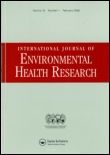
INTERNATIONAL JOURNAL OF ENVIRONMENTAL HEALTH RESEARCH
Scope & Guideline
Exploring the Nexus of Environment and Health
Introduction
Aims and Scopes
- Environmental Exposure Assessment:
Research focusing on assessing and quantifying exposure to various environmental pollutants, including air, water, soil, and food contaminants. - Epidemiological Studies:
Studies that investigate the links between environmental factors and health outcomes, employing various epidemiological methods to establish correlations and causative relationships. - Toxicological Research:
Investigations into the biochemical and physiological effects of environmental toxins and pollutants on human health and ecosystems. - Public Health Interventions:
Research evaluating the effectiveness of interventions aimed at reducing environmental health risks and improving community health outcomes. - Policy Analysis and Recommendations:
Studies that analyze environmental health policies and provide recommendations for improving public health frameworks and regulations. - Sustainable Practices:
Research exploring sustainable environmental practices and their impacts on health, including studies on waste management, pollution control, and conservation efforts.
Trending and Emerging
- Climate Change and Health:
Research exploring the impacts of climate change on human health is on the rise, addressing how environmental changes affect disease patterns, mental health, and public health systems. - Multifactorial Health Assessments:
There is growing interest in studies that assess the combined effects of multiple environmental factors on health outcomes, utilizing advanced statistical and modeling approaches. - Microplastics and Health:
Emerging concerns regarding microplastics and their health implications are becoming a focal point of research, driven by increasing awareness of environmental pollution. - Mental Health and Environmental Factors:
Research linking environmental conditions, such as urban green spaces and pollution, with mental health outcomes is gaining traction, reflecting a holistic view of health. - Innovative Interventions and Technologies:
Studies evaluating the effectiveness of innovative technologies and interventions for mitigating environmental health risks are trending, including the use of mobile health applications and community-based programs. - Sociodemographic Influences on Health Outcomes:
Research increasingly examines how sociodemographic factors intersect with environmental exposures to influence health outcomes, highlighting the importance of equity in public health.
Declining or Waning
- Traditional Toxicology:
Research specifically focused on traditional toxicological assessments has seen a decline, possibly due to the increasing emphasis on integrated approaches that consider environmental and social determinants of health. - Single Pollutant Studies:
Studies that examine the health impacts of individual pollutants without considering their interactions with other environmental factors are becoming less common, as interdisciplinary approaches gain traction. - Localized Environmental Health Concerns:
Research addressing localized environmental health issues, such as specific geographic health problems, appears to be diminishing in favor of broader, global health perspectives and meta-analyses. - Historical Exposure Studies:
Investigations focused solely on historical exposure assessments are declining, as researchers increasingly prioritize current and predictive assessments of environmental health risks.
Similar Journals

Exposure and Health
Empowering researchers to tackle exposure assessment challenges.Exposure and Health is a pioneering journal published by Springer, specializing in the interdisciplinary fields of health, toxicology, and environmental sciences. With an ISSN of 2451-9766 and E-ISSN of 2451-9685, this open-access journal exemplifies a commitment to disseminating high-quality research that informs public health practices and policies globally. Situated in the Netherlands, it boasts an impressive impact factor and ranks in the top quartile (Q1) across multiple categories in the 2023 Scopus rankings, including Health, Toxicology and Mutagenesis, Pollution, and Water Science and Technology. The journal is dedicated to advancing knowledge on the interactions between environmental factors and health outcomes, making it a vital resource for researchers, professionals, and students in these critical fields. Exposure and Health actively encourages submissions that address the challenges of exposure assessment, risk management, and the promotion of sustainable public health initiatives.
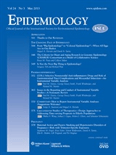
EPIDEMIOLOGY
Fostering collaboration for a healthier tomorrow.EPIDEMIOLOGY, published by Lippincott Williams & Wilkins, stands as a vital resource in the field of epidemiological research. With its ISSN 1044-3983 and E-ISSN 1531-5487, this journal has been a cornerstone for scholars since its inception in 1990. Covering a wide array of topics within the domain, it strives to disseminate cutting-edge findings that inform public health policies and clinical practices. Currently ranked Q3 in Epidemiology and positioned at #33 out of 148 according to Scopus, the journal boasts an impressive 78th percentile rank, reflecting its significance and impact within the academic community. Though not open access, EPIDEMIOLOGY provides robust access options for institutional subscribers, ensuring that critical epidemiological insights reach a broad audience. As this field continues to evolve, the journal remains dedicated to empowering researchers, practitioners, and students with the knowledge necessary to advance public health initiatives and improve population health outcomes.
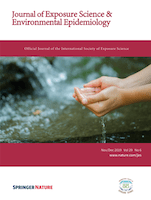
Journal of Exposure Science and Environmental Epidemiology
Pioneering Research at the Intersection of Health and EnvironmentJournal of Exposure Science and Environmental Epidemiology, published by SPRINGERNATURE in the United Kingdom, is a leading platform for researchers and practitioners dedicated to understanding the interplay between environmental factors and human health. With an impressive impact factor and Q1 and Q2 rankings across multiple categories such as Pollution and Public Health, the journal has established itself as a critical resource in the fields of epidemiology, toxicology, and environmental science. Covering a wide spectrum of studies from 2006 to 2024, it aims to disseminate timely research that empowers professionals and informs policy decisions. Although there is no open access option at this time, the journal's rigorous peer-review process ensures that only high-quality research is published, further cementing its reputation as a vital source of knowledge for advancing public health and environmental protection.

Journal of Environmental Science and Health Part C-Toxicology and Carcinogenesis
Unraveling the Impact of Environmental ToxinsThe Journal of Environmental Science and Health Part C-Toxicology and Carcinogenesis is a vital publication in the fields of environmental science, toxicology, and cancer research, published by Taylor & Francis Inc. With an ISSN of 2689-6583 and E-ISSN 2689-6591, this journal provides a platform for peer-reviewed research that explores the intersection of environmental factors and health outcomes, particularly focusing on toxicological and carcinogenic impacts. Though it does not currently offer Open Access, it remains a significant contributor to academia with its current ranking in the Q4 category for Cancer Research and Q3 in Health, Toxicology and Mutagenesis. The journal has converged from 2020 to 2024 and aims to disseminate pioneering studies that inform public health policies and foster a deeper understanding of environmental toxins. Aspiring researchers, professionals, and students will find this journal to be an essential resource for the latest findings and discussions within these critical fields.
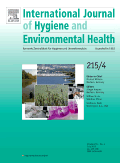
INTERNATIONAL JOURNAL OF HYGIENE AND ENVIRONMENTAL HEALTH
Pioneering excellence in hygiene and environmental health research.International Journal of Hygiene and Environmental Health, published by Elsevier GmbH, stands at the forefront of research in the fields of public health, environmental, and occupational health. With an impressive impact factor that underscores its significance—ranking #30 out of 665 journals in its category, placing it within the top 5%—the journal is a vital resource for academics and professionals seeking to expand their knowledge and contribute to advancements in the field. Since its inception in 2000, the journal has continually evolved, with its Q1 quartile designation reflecting its high-quality contributions and rigorous peer-review process. Accessible to a global audience, it offers flexible open access options, promoting the dissemination of critical findings on hygiene and environmental health issues. Published in Germany, the journal serves as an essential platform for researchers, educators, and practitioners to share innovative studies, timely reviews, and insightful discussions, driving forward the dialogue on public health challenges and solutions in today's world.
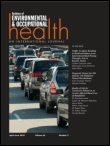
Archives of Environmental & Occupational Health
Elevating the discourse on toxicology and occupational safety.Archives of Environmental & Occupational Health is a prestigious journal published by Routledge Journals, Taylor & Francis Ltd, dedicated to advancing research and knowledge in the realms of environmental science, occupational health, and toxicology. With an ISSN of 1933-8244 and an E-ISSN of 2154-4700, this peer-reviewed journal has gained significant recognition, currently holding a Q2 ranking in Environmental Science and Q3 rankings in Health, Toxicology and Mutagenesis, and Public Health. Established in 2005, it serves as a vital platform for researchers, practitioners, and policymakers alike who aim to address and disseminate findings on pressing environmental and occupational health issues. The journal is not open access, allowing for rigorous peer review processes while still reaching a broad readership. As it converges through 2024, the Archives of Environmental & Occupational Health continues to play a critical role in shaping discourse and fostering innovation in the field, making it an essential resource for those committed to improving both human health and the environment.

Environmental Epidemiology
Pioneering research for a healthier, sustainable future.Environmental Epidemiology is a leading open-access journal published by Lippincott Williams & Wilkins, dedicated to advancing the field of environmental and public health research. Since its establishment in 2017, this journal has emerged as a vital platform for scholars and practitioners interested in the intricate relationships between environmental factors and health outcomes. With an impressive impact factor reflecting its rigorous peer-review process and a robust Scopus ranking—notably holding Q1 positions in categories such as Health, Toxicology and Mutagenesis, and Public Health—this journal is essential for those seeking to explore the latest findings and methodological advances in environmental epidemiology. Open access since 2018, it ensures wide dissemination of research findings, promoting accessibility and engagement among a global audience of researchers, policymakers, and students. As it continues to converge through 2024, Environmental Epidemiology remains committed to publishing high-quality articles that address pressing environmental health challenges, fostering interdisciplinary collaboration and knowledge sharing that is crucial for developing effective public health interventions.
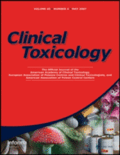
CLINICAL TOXICOLOGY
Bridging Knowledge and Practice in ToxicologyCLINICAL TOXICOLOGY is a prestigious journal dedicated to advancing the field of toxicology, published by Taylor & Francis Ltd. With ISSN 1556-3650 and E-ISSN 1556-9519, it has been a vital resource for researchers, clinicians, and students since its inception in 1968. The journal is recognized for its high impact, boasting a Q1 quartile ranking in both the categories of Medicine (miscellaneous) and Toxicology as of 2023, reflecting its reputation for disseminating significant contributions to the field. CLINICAL TOXICOLOGY primarily features original research, reviews, and case reports that explore the latest advancements and methodologies in the diagnosis and management of toxic exposures, making it an essential tool for professionals seeking to stay abreast of current trends and best practices. The journal's open access options ensure that its content is readily available to a wide audience, thereby promoting the exchange of knowledge and collaborative efforts within the global scientific community. For those committed to improving public health outcomes through toxicological research, CLINICAL TOXICOLOGY provides an indispensable platform for publication and discourse.

Environmental Health
Exploring the Impact of Environment on Public Well-BeingEnvironmental Health is a premier, peer-reviewed journal dedicated to advancing knowledge in the interdisciplinary field of environmental health. Published by BMC since 2002, this Open Access journal aims to disseminate impactful research that addresses the critical intersections between environmental factors and public health. With its impressive stature as a Q1 journal in key categories, including Health, Toxicology and Mutagenesis, Medicine (miscellaneous), and Public Health, Environmental and Occupational Health, it ranks within the top tier of its field, boasting significant visibility and a high impact factor as demonstrated by Scopus rankings. Scholars and practitioners alike benefit from its well-rounded approach and commitment to bridging science and policy, making it essential reading for anyone invested in understanding and mitigating environmental health risks. The journal is based in the United Kingdom, with a focus on promoting global accessibility to its findings.
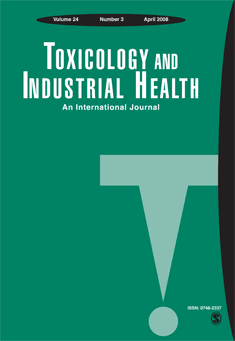
TOXICOLOGY AND INDUSTRIAL HEALTH
Bridging research and application to enhance environmental safety.TOXICOLOGY AND INDUSTRIAL HEALTH, published by SAGE PUBLICATIONS INC, is a premier journal in the field of toxicology, public health, and environmental health, with a significant history dating back to 1985. With its ISSN 0748-2337 and E-ISSN 1477-0393, the journal provides a platform for disseminating groundbreaking research and comprehensive reviews that address the complexities of toxic substances in industrial and occupational settings. Despite its Q3 ranking among peers in health, toxicology, and public health, this journal is becoming increasingly influential, reflected in its growing citation metrics. Researchers and professionals benefit from its commitment to fostering knowledge in both theoretical and practical contexts, making it an essential resource for those dedicated to advancing understanding in this vital field. The journal's main objectives include promoting research addressing the implications of toxicology on health and safety standards across industries, ensuring accessibility to current studies for a global audience. Overall, TOXICOLOGY AND INDUSTRIAL HEALTH plays a critical role in bridging the gap between research and real-world applications, proving invaluable to students, professionals, and researchers alike in their pursuit of enhancing public health and environmental safety.